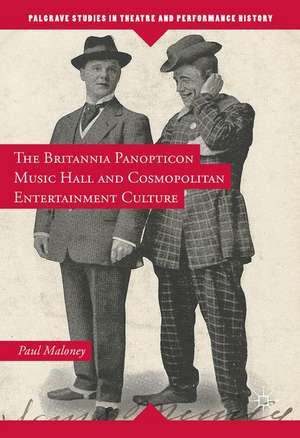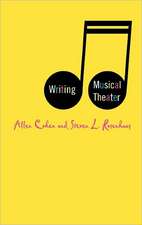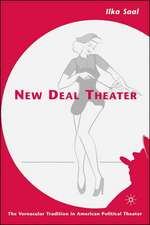The Britannia Panopticon Music Hall and Cosmopolitan Entertainment Culture: Palgrave Studies in Theatre and Performance History
Autor Paul Maloneyen Limba Engleză Hardback – 13 oct 2016
Providing a comprehensive analysis of this dynamic popular theatre of the industrial age, Maloney examines the role of the hall’s managers, marketing and promotional strategies, audiences, and performing genres from the hall’s opening in 1859 until final closure in 1938. The book also explores stage representations of Irish and Jewish immigrant communities present in surrounding city centre areas, demonstrating the Britannia’s diasporic links to other British cities and centres in North America, thus providing a multifaceted and pioneering account of this still extant Victorian music hall.
| Toate formatele și edițiile | Preț | Express |
|---|---|---|
| Paperback (1) | 579.27 lei 38-44 zile | |
| Palgrave Macmillan US – 25 dec 2019 | 579.27 lei 38-44 zile | |
| Hardback (1) | 642.94 lei 6-8 săpt. | |
| Palgrave Macmillan US – 13 oct 2016 | 642.94 lei 6-8 săpt. |
Din seria Palgrave Studies in Theatre and Performance History
-
 Preț: 304.38 lei
Preț: 304.38 lei -
 Preț: 303.28 lei
Preț: 303.28 lei -
 Preț: 299.96 lei
Preț: 299.96 lei -
 Preț: 306.81 lei
Preț: 306.81 lei -
 Preț: 308.81 lei
Preț: 308.81 lei -
 Preț: 301.10 lei
Preț: 301.10 lei -
 Preț: 307.44 lei
Preț: 307.44 lei -
 Preț: 303.28 lei
Preț: 303.28 lei -
 Preț: 300.85 lei
Preț: 300.85 lei - 8%
 Preț: 543.15 lei
Preț: 543.15 lei -
 Preț: 328.58 lei
Preț: 328.58 lei -
 Preț: 302.20 lei
Preț: 302.20 lei -
 Preț: 307.01 lei
Preț: 307.01 lei -
 Preț: 305.50 lei
Preț: 305.50 lei -
 Preț: 328.58 lei
Preț: 328.58 lei -
 Preț: 313.40 lei
Preț: 313.40 lei -
 Preț: 301.10 lei
Preț: 301.10 lei -
 Preț: 305.93 lei
Preț: 305.93 lei - 8%
 Preț: 533.03 lei
Preț: 533.03 lei -
 Preț: 306.14 lei
Preț: 306.14 lei -
 Preț: 305.50 lei
Preț: 305.50 lei -
 Preț: 337.40 lei
Preț: 337.40 lei -
 Preț: 307.68 lei
Preț: 307.68 lei -
 Preț: 309.87 lei
Preț: 309.87 lei - 8%
 Preț: 535.04 lei
Preț: 535.04 lei -
 Preț: 303.28 lei
Preț: 303.28 lei -
 Preț: 307.68 lei
Preț: 307.68 lei -
 Preț: 308.81 lei
Preț: 308.81 lei - 8%
 Preț: 533.03 lei
Preț: 533.03 lei -
 Preț: 324.21 lei
Preț: 324.21 lei -
 Preț: 385.56 lei
Preț: 385.56 lei -
 Preț: 301.28 lei
Preț: 301.28 lei -
 Preț: 299.96 lei
Preț: 299.96 lei - 8%
 Preț: 512.83 lei
Preț: 512.83 lei -
 Preț: 312.28 lei
Preț: 312.28 lei - 8%
 Preț: 535.04 lei
Preț: 535.04 lei -
 Preț: 298.91 lei
Preț: 298.91 lei -
 Preț: 304.38 lei
Preț: 304.38 lei - 8%
 Preț: 544.13 lei
Preț: 544.13 lei -
 Preț: 296.68 lei
Preț: 296.68 lei -
 Preț: 302.20 lei
Preț: 302.20 lei
Preț: 642.94 lei
Preț vechi: 756.40 lei
-15% Nou
Puncte Express: 964
Preț estimativ în valută:
123.02€ • 128.45$ • 101.82£
123.02€ • 128.45$ • 101.82£
Carte tipărită la comandă
Livrare economică 05-19 aprilie
Preluare comenzi: 021 569.72.76
Specificații
ISBN-13: 9781137479099
ISBN-10: 1137479094
Pagini: 295
Ilustrații: XIII, 273 p. 21 illus.
Dimensiuni: 148 x 210 x 21 mm
Greutate: 0.49 kg
Ediția:1st ed. 2016
Editura: Palgrave Macmillan US
Colecția Palgrave Macmillan
Seria Palgrave Studies in Theatre and Performance History
Locul publicării:New York, United States
ISBN-10: 1137479094
Pagini: 295
Ilustrații: XIII, 273 p. 21 illus.
Dimensiuni: 148 x 210 x 21 mm
Greutate: 0.49 kg
Ediția:1st ed. 2016
Editura: Palgrave Macmillan US
Colecția Palgrave Macmillan
Seria Palgrave Studies in Theatre and Performance History
Locul publicării:New York, United States
Cuprins
Chapter 1. Introduction.- Chapter 2. The Britannia Music Hall, 1859-1905.- Chapter 3. ‘Flying Down the Saltmarket’.- Chapter 4. ‘Ikey Granitestein from Aberdeen’.- Chapter 5. Pickard’s Panopticon, 1906-1938.- Chapter 6. ‘Paradise for a couple of hours’.
Recenzii
“ … the book is a pleasure to read – a treasure trove of examples of nineteenth- and twentieth-century popular performance, a testimony to the ways in which managers negotiated with the community around them and a well-written investigation into the relationship between urban shifts and the tensions and representations of contemporary immigrant communities.” (Louise Wingrove, Journal of Victorian Culture, Vol. 23 (2), April, 2018)
“Paul Maloney’s enthusiasm and meticulous re - search make this a fabulous and much welcome book. … The Britannia Panopticon Music Hall and Cosmopolitan Entertainment Culture is a rich study, thoughtfully constructed and expertly carried through. It will be of interest to all scholars of nineteenth- and early twentieth-century performance cultures and social histories, and is a much appreciated addition to the Palgrave studies in theatre and performance history series.” (Maggie B. Gale, New Theatre Quarterly, November, 2017)
Notă biografică
Paul Maloney has worked as a stage director in opera and has taught, researched and published widely in the fields of Scottish popular theatre and twentieth century Scottish political theatre. Research Fellow at Queen’s University Belfast, Northern Ireland, he is the author of Scotland and the Music Hall, 1850-1914 (2003).
Textul de pe ultima copertă
“Paul Maloney both concentrates and expands our understanding of this dominant institution in popular culture in evocative and challenging scholarship. Reconstructing the business, performance, and audience histories of Glasgow’s Britannia hall, Maloney traces its wider enmeshment in the city’s burgeoning entertainment industry, the development of a new cosmopolitanism, and the negotiation of crucial issues of modern pleasure and identity on the stage and in the streets.”- Peter Bailey, Visiting Professor of History, Indiana University USA
“This major contribution to the history of music hall in Britain explores the story of the Britannia, Glasgow. The long-surviving hall is treated as a case study in the development of music hall beyond London, and as such it delivers a convincing, innovative analysis as nuanced as it is fascinating.” – Jacky Bratton, Emeritus Professor of Theatre and Cultural Studies, Royal Holloway University of London, UK “In this penetrating work of social history, Paul Maloney emerges as one of the major interpreters of modern popular culture. His lively recovery of the Britannia Panopticon music hall in Glasgow becomes an exploration of urban life, ethnicity, national identity, mass entertainment, and modernity.” - Rohan McWilliam, Professor of Modern British History, Anglia Ruskin University, UK
Focusing on Glasgow’s earliest surviving music hall, the Britannia, later the Panopticon, this book explores the role of one of the city’s most iconic cultural venues within the cosmopolitan entertainment market that emerged in British cities in the nineteenth century. Shedding light on the increasing diversity of commercial entertainment provided by such venues – offering everything from music hall, early cinema and amateur nights to waxworks, menageries and freak shows - this study also encompasses the model of community-based, working-class music hall which characterised the Panopticon’s later years, challenging narratives of the primacy of city centre variety.
Providing a comprehensive analysis of this dynamic popular theatre of the industrial age, Maloney examines the role of the hall’s managers, marketing and promotional strategies, audiences, and performing genres from the hall’s opening in 1859 until final closure in 1938. The book also explores stage representations of Irish and Jewish immigrant communities present in surrounding city centre areas, demonstrating the Britannia’s diasporic links to other British cities and centres in North America, thus providing a multifaceted and pioneering account of this still extant Victorian music hall.
“This major contribution to the history of music hall in Britain explores the story of the Britannia, Glasgow. The long-surviving hall is treated as a case study in the development of music hall beyond London, and as such it delivers a convincing, innovative analysis as nuanced as it is fascinating.” – Jacky Bratton, Emeritus Professor of Theatre and Cultural Studies, Royal Holloway University of London, UK “In this penetrating work of social history, Paul Maloney emerges as one of the major interpreters of modern popular culture. His lively recovery of the Britannia Panopticon music hall in Glasgow becomes an exploration of urban life, ethnicity, national identity, mass entertainment, and modernity.” - Rohan McWilliam, Professor of Modern British History, Anglia Ruskin University, UK
Focusing on Glasgow’s earliest surviving music hall, the Britannia, later the Panopticon, this book explores the role of one of the city’s most iconic cultural venues within the cosmopolitan entertainment market that emerged in British cities in the nineteenth century. Shedding light on the increasing diversity of commercial entertainment provided by such venues – offering everything from music hall, early cinema and amateur nights to waxworks, menageries and freak shows - this study also encompasses the model of community-based, working-class music hall which characterised the Panopticon’s later years, challenging narratives of the primacy of city centre variety.
Providing a comprehensive analysis of this dynamic popular theatre of the industrial age, Maloney examines the role of the hall’s managers, marketing and promotional strategies, audiences, and performing genres from the hall’s opening in 1859 until final closure in 1938. The book also explores stage representations of Irish and Jewish immigrant communities present in surrounding city centre areas, demonstrating the Britannia’s diasporic links to other British cities and centres in North America, thus providing a multifaceted and pioneering account of this still extant Victorian music hall.
Caracteristici
Draws on first hand accounts to bring to life an iconic aspect of Glasgow's cultural history Provides a key exploration of the movement from Victorian urban entertainment culture to the modern entertainment market Examines the inner workings of the Britannia Panopticon from multiple angles to provide a comprehensive picture of the hall's evolution



















